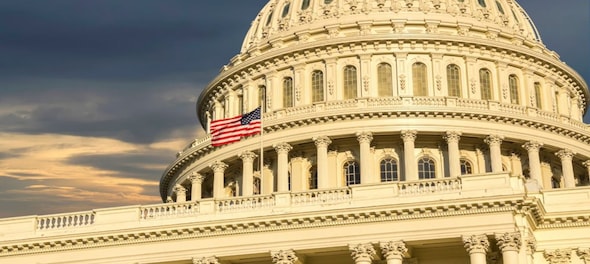
In an interconnected world facing numerous challenges, the importance of moral leadership cannot be overstated. Global leaders who embody and uphold moral values have the potential to foster trust, cooperation, and a more inclusive and just global order.
However, the United States, a country that has often positioned itself as a moral authority, must confront its own shortcomings and recommit to ethical conduct. In the complex landscape of global politics, the moral compass of leaders holds immense significance. However, the United States' tendency to preach while acting as a big brother, pursuing self-serving interests and disregarding moral values, has compromised its credibility.
Growing Debt Burden
The ever-growing debt burden in the United States poses a significant threat to its long-term economic survival. The nation's massive debt levels necessitate an honest appraisal of its fiscal policies and the sustainability of its economic model. To maintain credibility on the global stage, the US must address this issue head-on and work towards finding responsible solutions to tackle its mounting debt.
The recent debt deal reached in the United States has stirred discussions regarding the moral implications of changing the goal post. As political leaders negotiate and make compromises to manage the nation's debt, it raises concerns about the ethical ramifications of altering previously set agreements.
In recent years, the US has demonstrated a willingness to reword its economic legalese, altering the narrative around debt and its moral implications. This raises concerns about the nation's commitment to ethical financial practices and the impact on global economic stability. The moral question of changing the goal post in debt negotiations extends to the long-term fiscal stability of the nation.
Adhering to agreed-upon terms and diligently working towards debt reduction is essential for ensuring economic sustainability. Altering agreements without careful consideration can have serious implications, such as an increased risk of credit rating downgrades, rising borrowing costs, and reduced investor confidence.
The US must question whether these semantic shifts truly address the underlying challenges or serve as a mere means to justify unsustainable economic policies. No doubt that it must answer its own conscience, if it has it, if it still has the moral right to appoint leaders for multilateral institutions like the World Bank. It must consider whether it still possesses the moral right to guide and shape the global financial landscape.
Contradicting Values
The United States, once regarded as a beacon of democracy and human rights, must engage in honest self-reflection. Its foreign policy decisions and actions have often contradicted the values it purports to champion. The United States has often positioned itself as a moral authority, advocating for democracy, human rights, and global stability. However, its actions often diverge from its rhetoric, revealing a self-serving approach that undermines its credibility.
The US's prolonged engagement in wars across different regions has created a perception of an interventionist foreign policy. While some military actions may be justified, the persistent involvement in conflicts raises concerns about the motivations and long-term consequences. While some interventions may have been driven by genuine intentions to promote democracy or protect human rights, the consequences have not always aligned with the intended outcomes.
The principle of national sovereignty and the right of self-determination should guide international relations. The US's involvement in the arms industry has long been a subject of ethical debate. The sale of weapons, while providing economic benefits, raises questions about the moral implications of profiting from the tools of destruction. It is crucial for the US to reflect on the ethical dimensions of its arms business and consider alternative paths that prioritise global peace and security over financial gain. It is essential for the US to introspect on the impact of its military engagements, reassess its approach to global conflicts, and prioritise diplomatic solutions over military interventions.
Need A Paradigm Shift
A paradigm shift is necessary, one that places a premium on diplomacy, multilateralism, and collaboration, rather than a zero-sum game mentality. The legacy of Kissinger-style geopolitics, which prioritised US interests over global welfare, has left a lasting impact that the US must confront, and not pompously celebrate.
The pursuit of power and influence at the expense of other nations' well-being has created divisions and perpetuated global inequalities. Despite its self-proclaimed role as a global leader, the US has at times displayed behaviour reminiscent of a bully, driven by self-serving interests. It is essential for the US to recognise the need for self-reflection, acknowledging its role as a global actor and reassessing its own actions before preaching to the world.
Moral values lie at the heart of effective global leadership. Only through consistent ethical practices can the US truly claim the moral right to lead on the global stage.The United States must engage in self-reflection, acknowledging the disparity between its preaching and actions, and reevaluating its approach to international affairs. This needs humility for any introspection. Wonder where the US will start?
—The author, Dr. Srinath Sridharan, is a Policy Researcher & Corporate Advisor. He has also author of the book 'Time for Bharat'. The views expressed are personal.
Read his previous articles here
(Edited by : C H Unnikrishnan)
Check out our in-depth Market Coverage, Business News & get real-time Stock Market Updates on CNBC-TV18. Also, Watch our channels CNBC-TV18, CNBC Awaaz and CNBC Bajar Live on-the-go!


Lok Sabha Election Phase One: Bengal records 34% voting, Maharashtra 19%, Jammu 23% till 11 am
Apr 19, 2024 12:56 PM
Two TMC activists injured in attack in Bengal's Cooch Behar hours before polling
Apr 19, 2024 12:09 PM
Lok Sabha Polls 2024: Here is how the markets fared in Modi government's second term
Apr 19, 2024 11:44 AM
Lok Sabha elections 2024: Dibrugarh braces for intense electoral battle
Apr 19, 2024 11:18 AM

